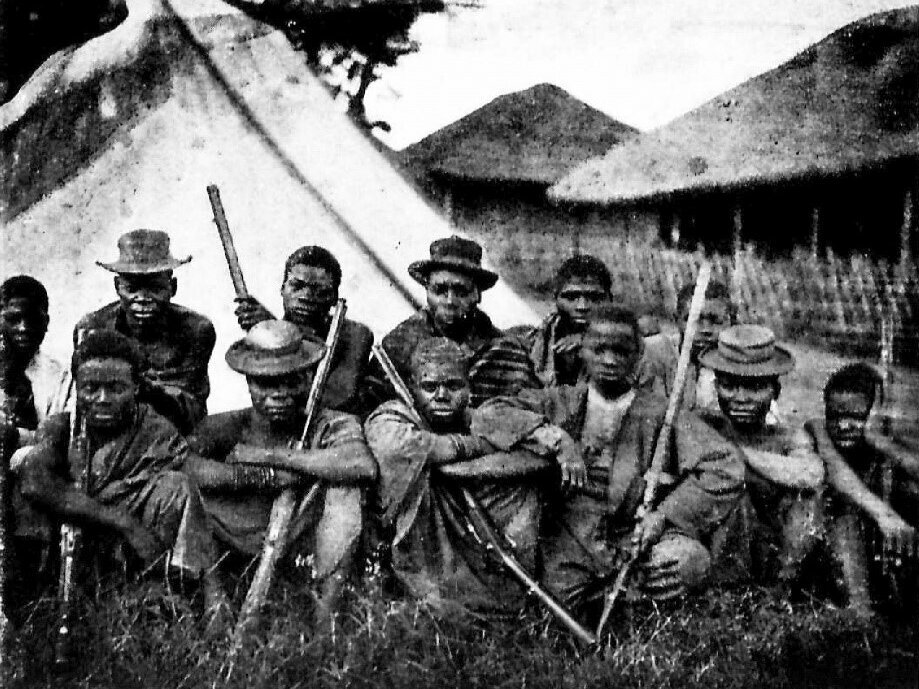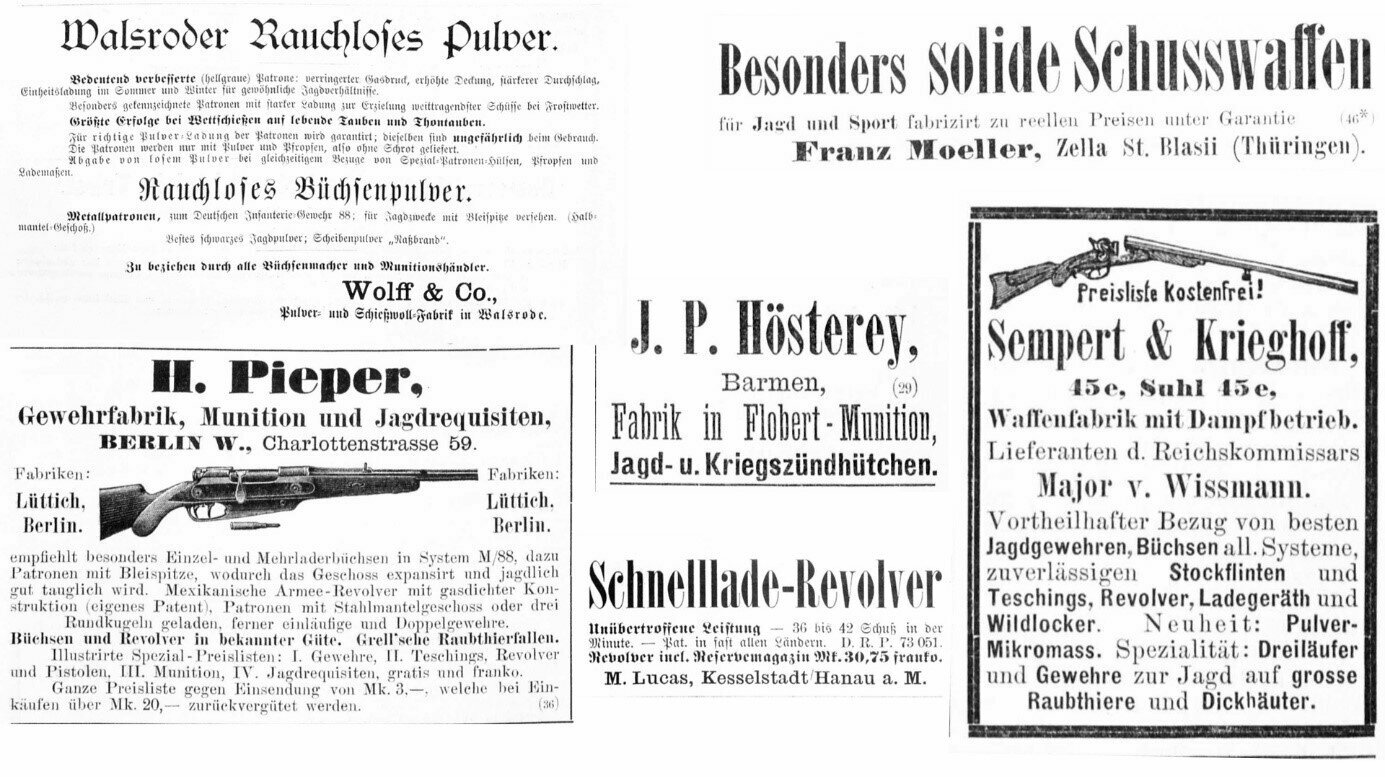 Merchandise of Power: Arms Trade and Control between Europe and East Africa, 1850–1919
Merchandise of Power: Arms Trade and Control between Europe and East Africa, 1850–1919
Felix Brahm
f.brahm@ghil.ac.uk
This research project studies the extensive firearms trade in East Africa in the context of globalizing trade relations and British and German colonialism in the region. Following the global commodity chains of the local firearms industry, the project takes a close look at the different locations and actors involved. It explores the local transfer und appropriation of firearms technology, examines the use of guns in various contexts, and assesses the social and ecological implications of firearms proliferation. African and European regimes of arms control are also studied and their significance for state-building and the construction of colonial society is analysed. In addition, it investigates the moralization of the arms business and establishes the colonial roots of international arms trade regulation.
Approach
The project explores the arms trade and arms control in East Africa through the interplay of global and imperial processes, regional developments, and local activities. It starts from the assumption that the global arms trade can only be understood if local appropriation and use of firearms technology is also studied meticulously, and thereby combines the well-established analysis of global commodity chains with the study of science and technology in local contexts.
By looking into both the arms trade and arms control, the project also unites an older research strand focusing on the role that firearms played for the slave trade, warfare, and state-building with a new field of research that is interested in the history of technology and consumption in Africa. Following a long-standing engagement with material cultures and commodity exchange in social anthropology, the project explores the modalities of the firearms trade, the cultural images attached to the gun, and the significance of the object in situations of cultural contact. It examines the social life that firearms obtained in East African communities and scrutinizes the social and ecological implications of firearms proliferation in different contexts, not least in the field of slavery and elephant hunting.
The second broad field of investigation is concerned with arms control in both pre-colonial and colonial times. Here, research focuses on the ways in which East African rulers established regimes of arms control, and inspects the role that firearms played in state-building and the transformation of chiefly power. Subsequently, the project examines the importance of the arms trade and arms control for establishing British and German colonial rule in the area. It assesses the military and fiscal importance of arms control and demonstrates its significance in constructing a racist colonial society. It also investigates the undermining of the colonial arms regime through open and covert forms of resistance, and sheds on the East African colonial origins of the first international arms trade treaty.
Sources
The project accesses a large array of primary sources, including company archives, administrative records, colonial laws and court cases, missionary repositories, family archives, memoirs, ethnographic and travel writings, literature, and oral tradition. Where possible, the project makes use of sources of African provenance. Archival research has been carried out in Tanzania, India, the United Kingdom, Germany, France, and Belgium.

Related publications
Felix Brahm and Eve Rosenhaft (eds.), Moralizing Commerce in a Globalising World, Studies of the German Historical Institute (forthcoming with OUP)
Felix Brahm, ‘Guns in Africa’, in T. Spear (ed.), Oxford Research Encyclopedia of African History (Oxford, 2020) [http://dx.doi.org/10.1093/acrefore/9780190277734.013.700] (24 pages)
Felix Brahm, ‘East Africa and the Post-War Question of Global Arms Control’, in K. Bromber, K. Lange, H. Liebau and A. Wetzel (eds.), The Long End of the First World War: Ruptures, Continuities, Memories (Frankfurt, 2018), 85–107
Felix Brahm, ‘Konflikte um ein globalisiertes Handelsobjekt: Feuerwaffen in Ostafrika, 1850–1890’, in Werkstatt Geschichte, 77 (2018), 29–46
Felix Brahm, ‘Armed with an Umbrella: Alexander Mackay and the Emerging Criticism of the East African Arms Trade’, in G. Castryck, S. Strickrodt, and K. Werthmann (eds.), Sources and Methods for African History and Culture: Essays in Honour of Adam Jones (Leipzig, 2016), 291–304
Related Events and Presentations
Selection:
Paper: ‘Gunpowder as a Strategic Resource in Pre-Colonial East Africa’, Workshop: Mobilising Resources for War, All Souls College Oxford, 10 Dec. 2019
Paper: ‘The Multifaceted Gun: The Case of Precolonial Central Tanzania’, Section: Histories of African Technological Landscapes, Annual Meeting of the Society for the History of Technology (SHOT), Milan, 24–27 Oct. 2019
Paper: ‘Local Resistance and Transimperial Cooperation: Origins of the Brussels Arms Trade Act of 1890’, Workshop: Arms Control Across the Empires, GHIL, 13 Sept. 2019
Workshop: Arms Control across the Empires, co-organized with Daniel Stahl, GHIL, 13 Sept. 2019
Conference: Moralising Commerce in a Globalising World: Multidisciplinary Approaches to a History of Economic Conscience, 1600–1900, co-organized with Eve Rosenhaft, GHIL, 22–24 June 2017
Conference: Small Arms – Big Business. Trading Small Arms: Political, Cultural and Ethic Dimensions in Historical and Global Perspective, co-organized with Dagmar Ellerbrock and Angelika Epple, Centre for Interdisciplinary Research Bielefeld, 8–10 June 2017